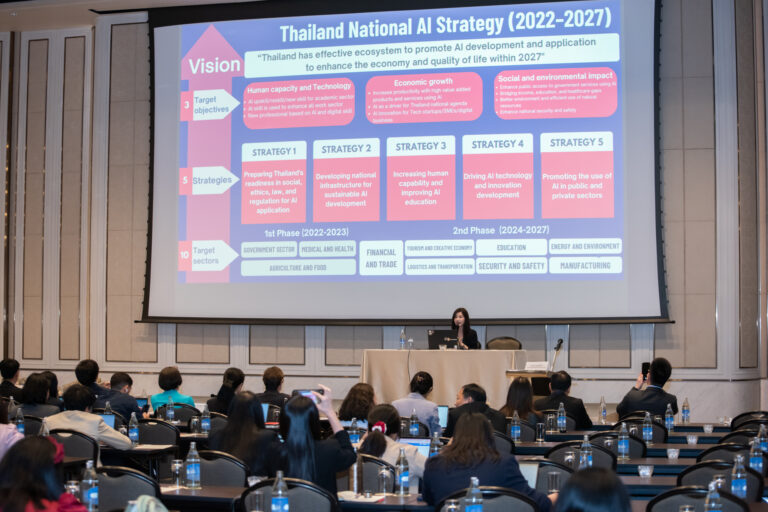
May 6, 2025 – Phayathai 4 Room, Eastin Grand Hotel Phayathai, Bangkok: The Ministry of Higher Education, Science, Research and Innovation (MHESI), through the National Science and Technology Development Agency (NSTDA), hosted a validation workshop for the Thailand Artificial Intelligence Readiness Assessment Report. This event marked a crucial step in reviewing and confirming study findings under the framework of the UNESCO Recommendation on the Ethics of Artificial Intelligence, utilizing UNESCO’s Readiness Assessment Methodology (RAM). The workshop saw participation from over 100 attendees, including NSTDA executives led by Dr. Chai Wutiwiwatchai, Director of the National Electronics and Computer Technology Center (NECTEC), NSTDA (representing the President of NSTDA); Dr. Kalaya Udomvitid, Vice President of NSTDA; Dr. Piyawut Srichaikul, Deputy Director of NECTEC, NSTDA; along with representatives from UNESCO, the European Union (EU), government agencies (public sector), the private sector/industry, and academic institutions.
This report is the result of collaboration between NECTEC NSTDA, UNESCO, the EU, the Electronic Transactions Development Agency (Public Organization) (ETDA), and the Thailand Development Research Institute (TDRI). It assesses Thailand’s AI readiness across five key dimensions: (1) Legal and Regulatory Framework, (2) Socio-Cultural Inclusion, (3) Scientific and Educational Capabilities, (4) Economic Impact and Labour Market Implications, and (5) Technical and Infrastructural Readiness. The assessment aims to provide a database and crucial guidelines for planning the development and promotion of AI use in Thailand effectively, responsibly, and in alignment with international ethical principles, thereby enhancing competitiveness and driving sustainable national development.

Dr. Chai Wutiwiwatchai, Director of NECTEC, NSTDA, and Thailand’s RAM Lead Expert, stated that Thailand is advancing ethical and inclusive AI governance, anchored by the Thailand National Artificial Intelligence Strategy and Action Plan (2022-2027). This plan, developed by MHESI in collaboration with the Ministry of Digital Economy and Society (MDES), provides a strategic framework to promote widespread AI adoption while ensuring responsible development aligned with human rights, transparency, and inclusive innovation. Recently, the National AI Committee, chaired by the Prime Minister, was established to concretely drive the national AI strategy.

Today’s workshop aimed primarily to validate the report, jointly developed over five months following UNESCO’s Readiness Assessment Methodology (RAM). RAM helps member states assess their preparedness and formulate policies promoting ethical and socially responsible AI development – a key mechanism for sustainable national economic and social progress. The workshop served as an important platform for representatives across the five dimensions to jointly review, discuss, and provide feedback on the draft report, ensuring its content is comprehensive, clearly reflects Thailand’s context, and generates concrete policy recommendations to guide the country’s future AI development.

Mr. Pinij Chandrarangsi, Regional Advisor at UNESCO Bangkok, remarked, “AI is not just a technological advancement; it represents a profound social and cultural revolution. For this reason, UNESCO, as the UN organization responsible for education, science, and culture, developed RAM with ethical principles at its core. This ensures that this societal and cultural transformation promotes and unleashes human potential rather than creating obstacles or undermining humanity. UNESCO established the first global standard on AI ethics, the Recommendation on the Ethics of AI, in November 2021, which Thailand and 192 other member states adopted as a guideline for practical implementation at the national level. UNESCO is therefore supporting Thailand and 69 other member states in successfully completing their RAM assessments. Thailand is currently one of seven ASEAN member states undertaking the RAM assessment.”
“Following today’s workshop, the expert team will compile all comments and information, which will then undergo UNESCO’s Peer Review process. The report will be revised into a globally standardized format before receiving official endorsement from the Thai government. The complete report will be launched on the global stage at The 3rd UNESCO Global Forum on the Ethics of AI 2025, which Thailand is honored to co-host with UNESCO from June 24th to 27th this year. This presents an excellent opportunity for Thailand to demonstrate leadership in AI ethics in the international arena. We are confident that this meeting marks another significant step towards advancing Thailand’s AI development ethically, responsibly, and tangibly demonstrating Thailand’s preparedness for ethical and sustainable AI adoption at the international level,” Dr. Chai Wutiwiwatchai concluded.


The workshop included a presentation on Thailand’s AI status and recommendations by Dr. Saliltorn Tongmeensuk, Senior Scholar at TDRI and Project Manager. An open forum allowed representatives from each dimension to provide feedback on the study and recommendations. Panelists included:
- Legal Dimension: Dr. Sak Segkhoonthod, Senior Advisor, ETDA.
- Social and Cultural Dimension: Assoc. Prof. Dr. Thanaruk Theeramunkong, Deputy Director for Administration, Office of Advanced Science and Technology, Thammasat University.
- Scientific and Educational Dimension: Asst. Prof. Dr. Akkarit Sangpetch, Director, AI Engineering Institute, CMKL University.
- Economic Dimension: Dr. Chinawut Chinaprayoon, Executive Vice President, Digital Economy Promotion Agency (depa).
- Technical and Infrastructure Dimension: Dr. Piyawut Srichaikul, Deputy Director, NECTEC, NSTDA.




The event concluded with a public hearing session to gather further comments on the project status report and additional recommendations for Thailand.
